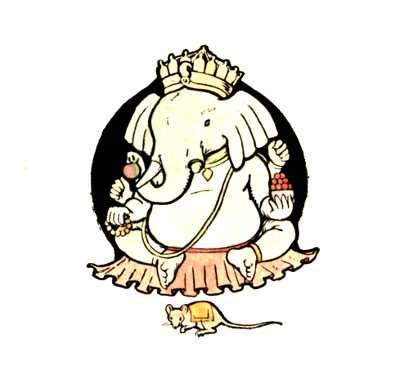Tales of an Elephant-God and other Historical Notes.
Of 100 Articles, Milestones, Success, and Overcoming Barriers to Success.
This is my 100th article for helloIndia!
Read the March roundup. The celebration offer is still available - enjoy 100 stories at your leisure - $3.60 a month or $36 for the year (or 36 cents per story). What’s more, once redeemed, the discount is always on!
In this commemorative piece, I feel compelled to touch on the significance of history and the import of storytelling.
Megasthenes, a Greek historian, in 302 BC, was the first known person to ever visit India journeying deep within the territory.
Sent as an ambassador to the court by Seleucus, Alexander’s general and successor, Megasthenes is also credited with writing the first book on India from his first-hand experience titled ‘Indica.’
His first-person account came from living five years in the court of one of the greatest kings heralded in Indian history - Chandragupta Maurya1 - who is credited with the golden era of prosperity and achievement in India.
Indica unfortunately is a lost text. Fragments of the book are cited in other books that survived. These were then pieced together by scholars to arrive at a chronological and fuller account of what Megasthenes witnessed in his five years in the royal court of the Mauryas.
As Herman Hesse once remarked, “Without words, without writing, and without books there would be no history, there could be no concept of humanity.”
In keeping with this spirit of exploration, I invite you to read these three tales of Ganesh(a), the Elephant-God revered for his wisdom and power to remove obstacles.
Let’s start with how Ganesha came to be born, and revered as a God with a unique status.
Once when the Goddess of Power, Parvati, was enjoying her privacy at home, some celestial visiting her husband, Shiva, the Destroyer-God, accidentally entered without knocking.
This breach of etiquette angered the Goddess. The Destroyer-God tried to pacify her but did not fully acknowledge the depth of her angst.
One day, Shiva had to leave home at the request of demigods, to prevent some evil beings from ruining the world.
The Goddess of Power, still fuming over the last intrusion, created her own bodyguard to protect her privacy.
She created a paste by mixing water with turmeric powder, (or was it mud?) to make an image of a small boy, and infused life into him - after all, she is the Goddess of Power.
Therein was born from her breath a beautiful little boy, no more than 8-10 years of age.
She instructed her son to stand guard at the main entrance door to their home and not let anyone inside the house while she took her morning ablutions.
The boy bowed to his mother and agreed to obey her command.
He stood guard outside the main home.
Weary from his battles, but triumphant, the Destroyer-God returned to find a strange boy guarding their home.
The boy, having been commanded to not allow 'anyone' inside, denied the Lord entry to his home.
At first, Shiva, amused by the attempt, spoke kindly to the boy, urging him to allow entry without revealing his identity or his connection to the Goddess of Power.
The boy held his mother’s commandment supreme and ignored Shiva’s attempts to reason with him, refusing him entry.
Shiva became increasingly angry2. He threatened the boy with dire consequences if he continued his stubborn refusal to let Shiva back into his own home.
The boy, born of the fearless Goddess of Power, who was an undefeated slayer of powerful demons, was not cowed.
Shiva had no recourse but to return to his mountain abode and dispatch his army to regain entry.
But every one of Shiva’s attendants and warriors sent to fight was defeated by the boy.
Finally, angered by the return of his defeated warriors in embarrassment, Shiva decided to teach the boy a lesson.
He engaged the courageous boy in a terrible battle. The boy put up a grand fight.
However, defeating the Destroyer-God was not his cup of tea - after all, we are talking about Shiva, the God whose remit it is to destroy the Universe one day.
After a fierce battle, Shiva beheaded the boy.
On his death, Shiva lauded the boy's bravery for having the courage to confront him and for defeating his formidable army of animals, goblins, ghosts, and ghouls.
As Shiva entered his home, victorious, he was met by his wife, the Goddess, who, having completed her rituals, was surprised to see him and inquired, “How did you enter? Where is my son?”
In that moment, Shiva realized his grave mistake.
Still, he asked her, “Do you mean the young boy, about ten years of age, who stood guard outside and refused to let me in—that boy?”
The Goddess nodded, explaining that she had created him for her protection.
Shiva was nonplussed.
He reflected, “How negligent of me not to have paused and pondered the boy's words without anger, to inquire who his mother was. How did I fail to realize that no ordinary boy could have defeated my army?”
He then gently explained to his wife what had happened.
Her reaction was more than he bargained for.
She refused to accept her son was dead and asked Shiva to not return unless her son was restored to her alive.
Shiva tried to make his wife see reason - he had slain the boy!
But she refused his pleas and threatened to forever forsake him if her son was not restored to her.
Shiva seeing the gravity of the situation and the anger and hurt of his wife, went outside to the place where the boy was lying dead.
He dispatched his army of followers to the four corners of the world with instructions to bring back the head of the first living being they encountered.
Of course, as it turned out, one group of followers traversing the direction entrusted to them found in their wake an elephant in a forest.
They brought its head back to Shiva and at his direction attached it to the boy’s body.
With the Creator-God’s help, Shiva then brought the boy with the elephant head back to life, named him Ganesha3, and blessed him.
The Goddess, Parvati, was pleased to receive her son, and now with both parents in tow, the boy Ganesha received the many Gods and demigods and was blessed by them with even many more powers.
Thus, he became the Elephant-God who removes barriers to the success of all human endeavors.
I promised ‘tales,’ so now that you know how Ganesha came to be so powerful and auspicious, here are some other short fun stories about him.
The author of the ancient epic, the Mahabharata4 was Veda Vyasa, a foremost sage with an unmatched intellect.
When he began to compose this behemoth - looked all over the world for someone who would be capable of writing down his narration of the complex story.
Ganesha approached him and offered his services.
But Ganesha set a condition, the sage must keep pace with his writing.
If his narration slowed and Ganesha had to pause in his writing, he would quit.
The sage agreed, but with a caveat, so he could buy time.
He set the condition too that Ganesha could only write down the text if he understood what the sage narrated.
Thus began a fierce competition between the two, to keep pace with each other, and that is how the Mahabharata - the lengthiest5 epic poem in world history - came to be written.
It is believed that one of the reasons why Ganesha has a broken left tusk is because he wrote so fast that he broke his quill, and rather than stop writing, he broke his tusk and used it as a quill to write.
Neither won the contest in the end except that the epic poem was written as a result.
I think we can nominate Ganesha as the patron God of writers too, what do you think? ;-)
Our final tale today has to do with this sibling story.
Once the Goddess of Power set a challenge for her two kids, perhaps tired of their fights.
Who could circle the world the fastest?
The older sibling, whose animal companion was a peacock, raised his han, and immediately set out to beat his brother.
Ganesha, whose animal companion is a rat, stayed put still eating his favorite desserts.
When asked by his mother why he did not set forth, the younger son rose and bowed before her.
Then he circled her thrice and bowed again.
The mother questioned his act.
Ganesha bowed again, “Mother, you contain the whole word within you. I have circled you thrice. That is equivalent to circling the world thrice.”
His mother was pleased with his answer and blessed him with unparalleled wisdom.
Both then awaited the return of the firstborn.
Thus, Ganesha is also the God of Wisdom, and a favorite among students, especially during exams!
A common winning prayer to Ganesha is: “Bestow us with wisdom and good sense, so we may be wise and discerning in our daily lives.”
Notes
Ganesha, or the Elephant-God, is considered supremely auspicious for those of the Hindu faith.
Ganesha is worshipped first in the performance of any task, project, marriage, ritual, or other forms of enterprise. His blessings are invoked to ensure success.
Many Hindu home entrances have some form of the depiction of Ganesh, right at the entryway as a sign of auspiciousness.
In India, Ganesha is commonly found in the lobby, or the entrance of many hospitals, buildings, stores, and public places where he may be worshipped daily.
In many cars, a small idol of Ganesha can be found on the dashboard, often attached with Velcro. Car manufacturers also commonly provide a small Ganesha idol as a gift for the dashboard upon purchase of a new car. Drivers offer a flower to seek his blessings, especially before embarking on important or long trips.
Annually, his festival is celebrated with great fervor in various parts of India. In this festival, people worship a mud or resin idol of Ganesha at home for ten days. After the ten days are up, the idol is traditionally immersed in the waters of nearby lakes, rivers, or water tanks. Mumbai is notably famous for the public display of these festivities, where hundreds of feet tall idols of Ganesha are immersed in the Arabian Sea.
Some folks collect various forms of miniature versions of the Ganesha idol and exhibit them in their home as art. When you visit curio shops in India, you may encounter a diverse array of the Elephant-God in varying sizes and poses, including dancing or writing forms. These idols are crafted from different materials such as metals, resin, or glass. It is fun to seek these out and see what the artists have conjured up.
Any Ganesha art form is considered to be a good and auspicious gift to give someone.
Note: The celebration offer is available until April 10 - enjoy all of the nearly 100 stories at your leisure - $3.60 a month or $36 for the year (or 36 cents per story). What’s more, once redeemed, the discount is always on!
You may wish to read the American historian, Thomas Trautmann’s books on this period. For a scholarly treatment of Maurya, the ruler, his life, Greco-Indo historical links, and the contradicting nature of accepted facts, read this free ebook - a doctoral thesis.
This is the story my classmate took objection to, specifically her question was: “If Hindu Gods are omniscient, then how could Shiva not know Ganesha was his son?” - as I recount in this story of my middle school days.
From the Sanskrit words: ‘gana’ = all people; ‘isha’ = Lord/God. Hence, he is named ‘Lord of the People.’ ‘ganas’ also refers to the various goblins and ghouls in Shiva’s army. So he is understood to be named also as God of Shiva’s army, the ganas.
Sanskrit, Maha = great; Bharatha = of the dynasty of Bharatha, who was the ancestor of the cousins and the five brothers - integral characters in the epic. Bharatha is widely regarded as the first emperor of a unified India, and the ruler after whom the nation came to be known as Bharat in Hindi.
The Mahabharata or ‘Great Epic of Bharata Dynasty,’ is a pivotal epic in Hindu mythology that is deeply ingrained in the cultural fabric, influencing many of its values. Its backstories, character development, subplots, and strategic plays surpass those of Game of Thrones. With a length ranging from 100,000 to 120,000 couplets, containing nearly 2 million words, it is 7-10 times the length of the Illiad and the Odyssey.











What do you call a person who speaks two languages? Bilingual.
What do you call a person who speaks many languages? Polylingual.
What do you call a person that only speaks one language? An American.
For any other Americans who, such as myself, find their linguistic abilities somewhat limited to say the least, that have a few minutes to spare and wants to read the Mahabharata of Vyasa, an English translation of all 5.818 pages is available for download at https://www.holybooks.com/the-mahabharata-of-vyasa-english-prose-translation
This is wonderful Jayshree. I love reading your stories about the Gods and Goddesses. I love mythology.